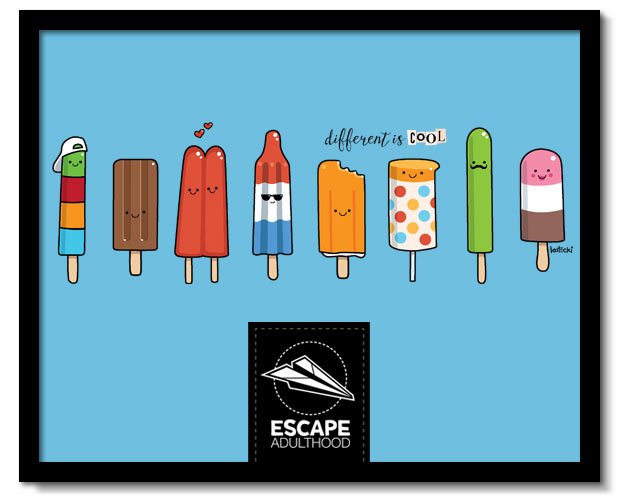
Art, t-shirts and other goodies available here.
Is it possible to be correct when all the experts think you’re nuts?
Iggy was a doctor who lived in the 1800s and was greatly concerned about the high rate of women dying after childbirth. He knew there had to be a reason for the problem, so he experimented with different solutions. Finally, he figured out a simple practice that was easy to do, and when it was followed saved lives.
His colleagues rejected and ridiculed his idea, branded him a quack, and he was eventually committed to a mental institution where died two weeks later. The thing is, his idea worked, he just couldn’t explain why. His solution was too out there, too unorthodox, too different from what the experts were used to.
What’s so threatening about different?
Can you imagine turning on your car radio only to hear the same song on every single station?
What about going to a restaurant that only had one thing on the menu?
Or firing up Netflix and finding just one show to watch?
I think we can all agree that a world without options would be very boring indeed.
Different is cool.
Except when it comes to things that challenge our beliefs or question our long-held assumptions.
The human brain is engineered to be a pattern recognition machine. We are built to notice differences and changes in our environment. It helps us determine a storm is coming that requires us to seek shelter, notice an accident up ahead that suggests we should slow down, or that there is a lion in our camp we might want to avoid. We notice breaks in the pattern and make a prejudgement to feel safe or prepared.
Lately, we have been struggling with this often helpful but sometimes not-so-helpful feature of noticing differences and making snap judgments. We are taught in after-school specials that prejudice is bad, and if we catch ourselves doing it, experience feelings of guilt or shame.
My friend Jessica, a speaker, comedian, and diversity trainer, reminded me that we shouldn’t feel guilty about these judgments and assumptions; after all, they happen automatically and can be useful. What really matters is what we do with them.
Jessica’s suggestion was this: “When you write that first story, print it as a draft, triple-spaced with extra-wide margins. You do this because you’re anticipating edits.”
So back to Iggy, formally known as Ignaz Semmelweis. What was his crazeballs idea? Only that doctors should wash their hands before working with patients.
After his tragic demise, a small group of curious scientists experimented with the procedures he proposed. Eventually, his theories finally gained widespread acceptance years after his death, partly thanks to Louis Pasteur’s scientific confirmation of germ theory.
He also inspired what is now known as the Semmelweis reflex: a metaphor for a certain type of human behavior characterized by the reflex-like rejection of new knowledge because it contradicts entrenched norms, beliefs, or paradigms.
Was it a terrible thing for the first reaction from the experts of the day to dismiss Iggy’s idea? No, not necessarily. After all, it went against the pattern of everything they knew to be true at the time. The scientists who originally branded Iggy a crackpot weren’t jerks for thinking that his ideas were weird. They were jerks because they didn’t leave enough room for edits to their original story about him. They should have been open to examining more facts, even if it might lead them away from what they believed to be true. But they weren’t, which is a shame when you think about how many lives could have been saved.
It’s always a useful exercise to spend time exploring a point of view that is the opposite of what we’re used to. It could be watching a documentary, reading a book, or having a real conversation – not a Facebook fight – with a human being.
Our brains are pretty great at noticing differences and making assumptions.
A more constructive alternative to wishing they weren’t so effective at that task might be to figure out whether our assumptions and prejudices are actually serving us, and act accordingly.
Anticipate edits.

